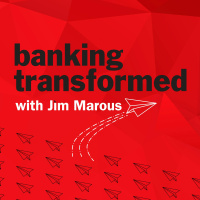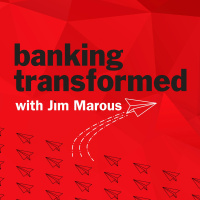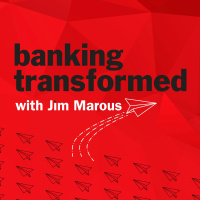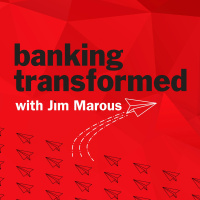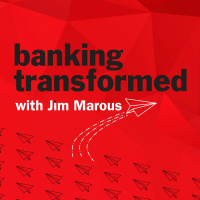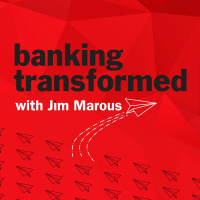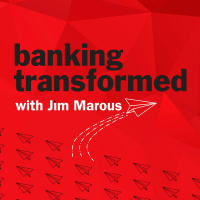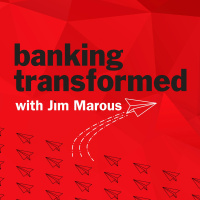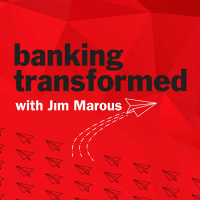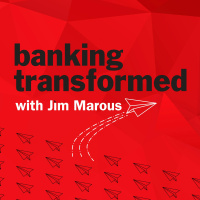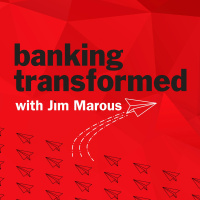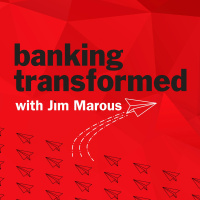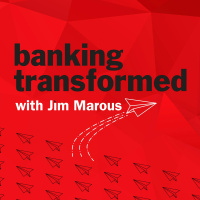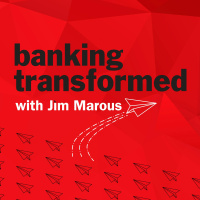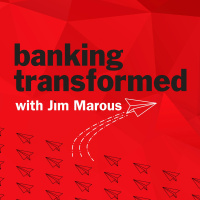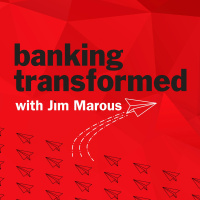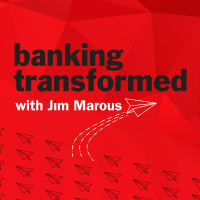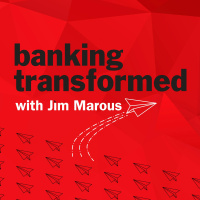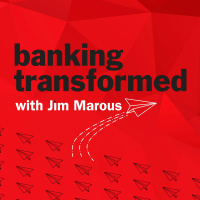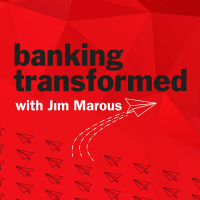Synopsis
Are you prepared to embrace change, take risks and disrupt yourself in response to the digital disruption in banking? If not, this podcast is for you. Hosted by top 5 banking and fintech influencer, Jim Marous, Banking Transformed highlights the leadership and cultural challenges facing the banking industry. Featuring interviews with some of the top minds in business, this podcast explores how financial institutions can prepare for the future of banking.
Episodes
-
Leadership Excellence in Crisis: An Interview with Tom Peters
12/05/2020 Duration: 42minThe best and most respected leaders shine the brightest during times of crisis. Not relying on a crisis management plan, the best managers surround themselves with the best people and provide a platform for growth for those within the organization. As a result, moving to a work from home environment should not disrupt an organization, but simply change the environment from where work is done. In all industries, especially banking, those institutions that have most respected leaders will be the winners. We are very fortunate to be joined today by Tom Peters, one of the most respected names in business for over 40 years. A management revolutionary, Tom was the coauthor of what many considered to be the best business book ever, ‘In Search of Excellence’. A prolific bestselling author, Peters has written close to 20 books over the years. In today’s episode, Tom shares his insights and what differentiates a great leader during times of massive change.
-
How Fintech Unicorn Lemonade is Disrupting Insurance
05/05/2020 Duration: 41minThe financial services industry is known for century-old institutions with rules and policies that are often outdated, yet preserved by regulations. Whether we are talking about banking, insurance or investment services, transformation is often slow and outside competition is met with significant resistance. This is why it is so exciting to do a profile on a disruptor organization that finds success despite these hurdles. Lemonade is such a company, forming an insurance company that aligns the interests of the carrier with those of the customer, in a way that is economically viable. They have found success using cutting edge technology, a completely different business model and a passion for doing good. We caught up with Lemonade’s CEO and cofounder Daniel Schreiber for an exclusive interview to find out how artificial intelligence, behavioral economics and a focus on transparency and purpose have been used to disrupt the centuries-old insurance industry.
-
COVID-19 Impact on Future of Retail Banking
29/04/2020 Duration: 38minThe COVID-19 pandemic is the most serious challenge to retail banking in almost a century. Retail banks have had to rethink distribution, support government relief programs and manage remote workforces, all while trying to meet consumer expectations during a period of household-level economic uncertainty. These challenges are only the tip of the iceberg, however, as the economic fallout and the redefined structure of the financial services ecosystem are beginning to emerge. It is clear that the ‘new normal’ in retail banking will be far different than we ever imagined only a few months ago. We are fortunate to get an exclusive interview with Richard Hunt, president and CEO of the Consumer Bankers Association (CBA). Since his appointment in 2009, Hunt has helped to navigate the banking industry through a period of unprecedented change. In this episode, Hunt provides his perspectives for the future of retail banking during a period of tremendous uncertainty.
-
The Digital Banking Tipping Point
28/04/2020 Duration: 36minAccording to Malcolm Gladwell, a ‘tipping point’ is the moment of critical mass, when an idea, trend or behavior crosses a threshold and spreads like wildfire. The COVID-19 crisis is an example of such a phenomenon and so has been the instantaneous impact of this crisis on the digital transformation of banking. Organizations that had not already embraced the entirety of how to become a ‘digital bank’ were caught flat footed as branch doors were closed and customers were required to transact on digital channels. In some cases, accounts couldn't be opened or loan applications taken, In all cases, organizations that had not digitally transformed their operations, products and culture delivered suboptimal customer experiences. We are fortunate to be joined again by one of the foremost authorities on the future of banking, Chris Skinner. Chris is a prolific blogger and he is joining us today to discuss his newest book, “Doing Digital: Lessons from Leaders”. In this episode, Chris capsulizes interviews he d
-
COVID-19 is Fast-Tracking Digital Transformation
21/04/2020 Duration: 49minIn the book, 'Disrupt Yourself', by Whitney Johnson, it is suggested that the disruptions and changes that matter most start with personal disruptions and change. There is no doubt that the COVID-19 crisis has disrupted every person’s life and every organization’s business model. The crisis has impacted the way we learn, the way we interact, the way we work and the way we think about our personal and corporate priorities. Every step of the way, modern digital technologies have been brought front and center, with the importance of data, advanced analytics and contextualization being shown to be more important than ever. We are fortunate to be joined today by Tamara McCleary, the CEO of Thulium and a top 10 social media influencer in AI, robotics, digital technology and martech. A globally recognized futurist and keynote speaker, Tamara shares her perspectives on the impact of COVID-19 on the technology ecosystem and what consumers will be expecting when this crisis subsides.
-
The Future of Work Post COVID-19
15/04/2020 Duration: 37minAfter COVID-19, the world around us will be changed forever. In a matter of weeks, working from home has become the norm, not the exception. The virus has forced a reckoning of how we view work, travel, engagement with others and the technologies that make these possible. Before the pandemic, digital transformation was optional for many organizations. When COVID-19 took hold, necessity dictated that all organizations ‘become digital’. Virtually all work that can be done online has gone online, with new ways to collaborate and innovate. With work-from-home quickly becoming the norm, it is unlikely that the corporate office will be the only place to ‘get things done’ in the future. Our guest is Benjamin Pring, head of Cognizant’s Center for the Future of Work. Ben is a co-author of the best-selling books, 'What To Do When Machines Do Everything' and 'Code Halos; How the Digital Lives of People, Things, and Organizations are Changing the Rules of Business'. In this episode, Ben provides a glimpse into th
-
Financial Irrationality During COVID-19 Crisis
14/04/2020 Duration: 30minDespite the best intentions, consumers do not always act rationally with regards to money management. While we all know that we should limit debt and increase savings, many people live day-to-day, and have far less set aside for financial emergencies than needed. Unfortunately, most people’s irrational behavior around money became exposed with the impact of COVID-19. Across the globe, households lost their safety net of predictable events that they depended on, from a regular paycheck to savings that they had planned to set aside. Today’s guest on the podcast is Dan Ariely, the foremost researcher of behavioral economics in the world. A prolific best-selling author, fintech advisor and professor at Duke University, Ariely discusses why humans don’t always act rationally about money and the result of these irrational behaviors. He also shares thoughts on how consumers and financial institutions can recover from the challenges brought on by COVID-19.
-
Building a Culture-Driven Virtual Bank
07/04/2020 Duration: 28minI had the unique opportunity to visit WeLab as part of my visit to China in early January. WeLab uses proprietary risk management technology and advanced AI to analyze mobile data within seconds, providing financial solutions to over 42 million customers across Asia. WeLab is also one of the first institutions to receive a virtual banking license in Hong Kong. Despite the advanced technology and innovative deployment of digital products and services, what impressed me most about WeLab during my visit was the evolving culture of the organization and the commitment to employee as well as customer satisfaction. Today’s guest on the podcast is Simon Loong, Founder and Group CEO of WeLab. During our interview, Simon shares his perspective on how to use mobile data to create customer profiles and the importance of culture within a rapidly growing organization. We also discuss the lingering impact of COVID-19 on his organization and on China.
-
Banking Must Improve Financial Wellness For All
31/03/2020 Duration: 35minAccording to the 2019 U.S. Financial Health Pulse report, less than 30% of Americans could be considered financially healthy, with millions of households not having enough money in savings to get through a month. These are the people who are the most at risk given today’s COVID-19 crisis. The longer this crisis continues, the greater the financial impact on consumers at all levels. Protracted and dynamic pandemic conditions will also draw out anxiety and financial stress impacting relationships and creating underlying phychosocial behaviors. Unfortunately, things will get worse before they get better. Today’s guest on the podcast is Jennifer Tescher, President & CEO of the Financial Health Network, the nation’s authority on consumer financial health. Tescher founded the Financial Health Network in 2004. During our interview, Jennifer shares her perspective on what both government and the banking industry need to do to support the financial health of all citizens.
-
COVID-19 Will Change the Way Consumers Bank Forever
26/03/2020 Duration: 33minThe number of bank branches and the number of people visiting bank branches has been decreasing for years. As a result of recent events, many organizations have closed branches completely, while others have reverted to auto teller operations. Could the Coronavirus create a shift in attitude, as people are forced to bank online or on their mobile devices? More importantly, as consumers get more comfortable, and find that managing their money digitally is easier and safer, will they stop visiting their bank branch altogether … even after the pandemic ends? Today’s guest on the podcast is Jamie Warder, EVP and head of digital banking at KeyBank. Prior to joining Key, Jamie was the President of USAA Bank as well as working at Capital One, PNC Bank and McKinsey & Co. During our interview, Jamie discusses the way KeyBank is shifting to a more digital organization, while still supporting traditional channels. He also discusses how KeyBank is responding to the recent marketplace changes.
-
Organizations Should Double Down on Innovation Now
25/03/2020 Duration: 33minThe push for digital banking amid the growing emphasis on social distancing has put a spotlight on those organizations that have lagged behind the marketplace with digital delivery and digital transformation. But, can laggard organizations pick up the pace when the rest of the world grinds to a halt? We are faced with a unique time in banking where organizations that have invested in advanced analytics, innovation and digital transformation have the opportunity to leverage their customer experience and digital product advantages more than ever. Today’s guest on the podcast is Jeremy Balkin, the head of innovation at HSBC. Jeremy is also the author of two books, ‘Investing with Impact: Why Finance is a Force for Good’, and ‘Millennialization of Everything: How to Win When Millennials Rule the World’. During our interview, Jeremy discusses the importance of innovation during times of disruption and how organizations can go further to illustrate empathy through innovation.
-
Marketing During Times of Disruptive Change
24/03/2020 Duration: 35minThe marketing profession has moved from art to science, with the use of new technologies powered by artificial intelligence (AI), with a level of personalization and real-time communication only dreamed of in the past. But, how does marketing change during a time of economic crisis? As opposed to using marketing to sell products, how can marketing be leveraged to help customers manage their finances and provide support during difficult times? Where speed, tone and clarity of communication is of utmost importance, how can financial institutions help consumers use channels they may be unfamiliar with and proactively provide financial solutions they may be unaware of? Today’s guest is Rohit Mahna, head of the financial services practice at Salesforce. He’s got an insider’s perspective on how financial institutions can use data and advanced analytics to meet consumer needs while building brand loyalty. We discuss how organizations can combine empathy with solution-based marketing, moving transactions to d
-
How AI Can Revolutionize Banking
17/03/2020 Duration: 36minFinancial institutions that are leaders in the use of data and AI are quickly differentiating themselves in a marketplace that puts a premium on data-backed decisions and intelligent interactions. AI brings the potential for disruption and transformation due to its ability to make decisions and take action much quicker than its human counterparts. It has been seen as a means of increasing productivity within a company and improving revenues through better customer engagements. But the use of AI is not without pitfalls, risks and detractors. Will AI discriminate between classes of people? Will AI be used for good or just corporate greed? How should the use of AI be regulated? To discuss the opportunities and challenges of AI in banking, we interviewed Dan Faggella, founder and CEO of the artificial intelligence research agency, Emerj. Dan is a globally recognized speaker on the use-cases of artificial intelligence in business, and has presented to the World Bank, the United Nations, INTERPOL, and g
-
Globalization of Fintech and Banking in the Age of Disruption
10/03/2020 Duration: 34minThe marketplace is in a state of confusion and disruption as the coronavirus outbreak impacts the banking ecosystem and all industries worldwide. Changing valuations and funding options for legacy and non-traditional financial firms are creating the need for new business models as well as opportunities for partnerships and the platform for new government regulations. To discuss the global impact of fintech organizations and the potential of open banking, financial inclusion, and sustainability as consumer demands change, we are honored to be joined by William Russell, the Lord Mayor for the City of London. As holder of a post that dates from the 12th century, Mr Russell's role is to promote investment in regional fintech firms and to encourage government support of the overall financial services industry in the region.
-
Transforming Customer Experiences with Personalization
03/03/2020 Duration: 36minIn a digital world, consumers want experiences that are highly personalized and contextual. From the way they search to the way they shop, view content or do banking, consumers expect organizations to know them, look out for them and reward them. Unfortunately, the majority organizations are only delivering basic personalization and are focused more on product sales than on helping the consumer manage their finances or their daily life. In other words, there is a massive personalization gap. On today’s podcast, we will discuss the importance and process of delivering hyper-personalized experiences, across all channels, as part of digital transformation. We will also discuss the importance of creating personalized engagement that requires a minimal of effort from the consumer to ‘make it happen’. I am joined today by Jody Bhagat, president of the Americas for award-winning financial services personalization agency, Personetics. Jody is an industry veteran, having previously been a partner at McKinsey &
-
The Importance of Attracting Rebel Talent
25/02/2020 Duration: 30minTraditional organizations find rebels to be disruptive troublemakers who make processes and decisions more difficult. Legacy organizations that are embracing digital transformation find these same 'misfits' to be a positive influence on innovation, creativity, growth and cultural change. We are joined today by Matteo Rizzi, who has authored a great book entitled, 'Talents and Rebels'. In this episode, he discusses interviews and personal observations that make a case for organizations to embrace those people who may appear disruptive to the norm. In fact, he suggests that we should seek out more of this type of talent.
-
Why Digital Transformations Fail
18/02/2020 Duration: 33minDigital transformations have an exceeding high failure rate despite being one of the most important components of a firm's long-term survival. Digital transformation requires must more than just a flashy mobile app or new technology. To understand the dynamics of how to succeed with digital transformation, we are joined by Tony Saldanha, previous head of operations and digital transformation at Proctor and Gamble and currently the president of Transformant, a Cincinnati-based consulting firm focused on digital transformation. As the author of the book, 'Why Digital Transformations Fail', Tony shares his 5-stage framework that any company can follow to successfully navigate its own digital transformation. Tony discusses why the ultimate proof of an organization’s success at digital transformation is its cultural, not technical rewiring.
-
Cultivating a Disruption Mindset
11/02/2020 Duration: 28minWe have often discussed the correlation between innovation and digital transformation, and the positive impact on consumer satisfaction, investment in advanced technology, the presence of top management support and the positive impact on revenues. But, while technology may enable the disruption required, it is often the application of existing technology in new ways that disrupts an industry. Finally, while disruption is not always fast, it is the lack of reaction to disruption that catches incumbents flat footed. We are very fortunate to have Charlene Li on the show today. Charlene is the founder and senior fellow at Altimeter, a Prophet company. She is the author of six books, including the New York Times bestseller 'Open Leadership', and co-author of the book 'Goundswell'. Her latest book, 'The Disruption Mindset' is the culmination of years of research and experiences in the field helping leaders and organizations transform. On this episode, you will learn the secret of successful disruption, the
-
China: Emergence of a Tech and Innovation Superpower
04/02/2020 Duration: 42minThe debate about what city is the fintech capital of the world continues, as more players enter the market and more money is invested into the very active fintech ecosystem. Is the fintech capital London, New York, the Silicon Valley or elsewhere? Should the title go to the city with the most players, the greatest fintech investment or the largest number of users of challenger bank or bank challenger services? My perspective on a possible candidate for the fintech capital definitely changed when I visited Shenzhen, China recently. From the advancement of smart city technologies, to the deployment and use of digital technologies for payments, energy management, operational efficiency and even daily tasks like shopping and eating out, I have never experienced so many modern advancements than during my short week in China. As part two of my review of my tour of Shenzhen, I am joined today by Brett King, author of many best selling books on the future of banking and the host of the number one fintech podc
-
The Chinese Fintech Revolution
28/01/2020 Duration: 45minChina is quickly becoming home to the largest fintech ecosystem in the world, benefiting from historically low use of traditional banking, high smartphone penetration, a changing demographic and a consumer acceptance of banking without traditional infrastructure. Dominated by giants like Baidu, Ant, PingAn and Tencent, combined with many highly successful start-ups like WeLab, the success in delivering both personalized financial services and an impressive level of financial inclusion is a model for the rest of the world. This is not a story of disruption of legacy banking as much as a story of filling a previously unmet need for advanced financial services supported by smartphones. To discuss how fintech firms have benefited from open access to data, and how the Chinese consumer benefits from value added services not available to most in the world, I am joined by my friend, Matt Dooley, founding board member of the Fintech Association of Hong Kong and founder of Connected Thinking Ltd. who guided a t

